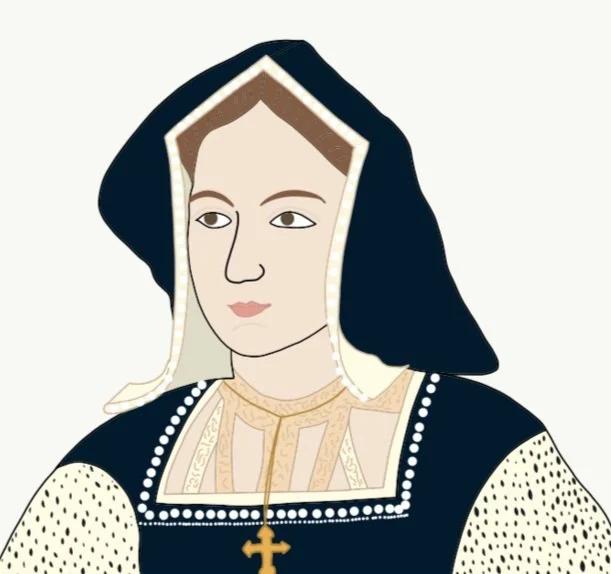June 6th - 12th
“D-Day, the Great Plague and Vikings raiding Lindisfarne - this week in history was full of major events...”
On 6th June…
1944 - D-Day or Operation Overlord went ahead during World War II with over 155,000 Allied troops landing on the beaches of Normandy in what was to be a successful attempt at pushing back the Nazi forces and reclaiming France.
On 7th June…
1329 - Robert the Bruce, King of Scotland died. He is famous for defeating the English at the Battle of Bannockburn and re-establishing an independent Scottish monarchy.
Henry VIII and the Cloth of Gold
1520 - Henry VIII and King Francois I of France began their meetings at the Field of the Cloth of Gold in France in an effort to improve relations between England and France. It was the start of eighteen days of feasts, tournaments, masquerades and religious services. The event is captured in a painting most probably painted for Henry VIII himself.
Samuel Pepys and the Great Plague
1665 - Samuel Pepys wrote in his diary about the Great Plague noting that there were some houses of Drury Lane marked with a red cross. This meant that somebody living there had caught the plague and had to be locked inside for 40 days or until death.
On 8th June…
632 - Muhammed, the founder of Islam, died in the arms of his third wife Aisha.
793 - The Vikings invaded St Cuthbert’s monastery on the island of Lindisfarne off the north-east coast of England. They ransacked the monastery for treasure and killed, or took as slaves, all the monks living there. This is often quoted as the first Viking attack on the English mainland but an earlier record in 787 states that the Vikings had attacked and killed a local leader in Wessex when he went to take them to the king.
Henry VI executes the Archbishop of York
1405 - The Archbishop of York, Richard Scrope, and the Earl of Norfolk, Thomas Mowbray, were executed for treason under the order of King Henry IV. They were guilty of plotting a rebellion against the king.
On 9th June…
68CE - The Roman Emperor Nero committed suicide to evade execution by flogging. He was emperor at the time of Queen Boudicca’s uprising in Britain and is the man responsible for Rome being rebuilt in the style of Ancient Greece following the Great Fire of Rome. Nero was extremely extravagant; spending money on things that were not necessary. He was also a great lover of the arts, theatre and poetry. Nero fell foul of the Roman Senate and the Praetorian guard for many things, but it was made worse when he insisted on performing as an actor on stage instead of just ruling the Empire. He acted in roles the Senate deemed beneath him, not just as an Emperor, king, or man of authority but as characters from all walks of life including beggars.
Charles Dickens dies
1870 - Charles Dickens, the famous British author died. Some of his famous books include Oliver Twist and A Christmas Carol.
On 10th June…
Thomas Cromwell arrested
1540 - Thomas Cromwell, Henry VIII’s trusted advisor, was arrested for treason and heresy (having different religious beliefs) and taken to the Tower of London.
1921 - Prince Philip, the Duke of Edinburgh and husband to Queen Elizabeth II, was born on the Greek island of Corfu.
On 11th June…
1488 - King James III of Scotland was murdered by rebellious Scottish nobles who were tired of his favouritism and poor management. He was replaced by his 15-year-old son King James IV who was among the rebels. Despite his inadequate ruling, King James III is responsible for Scotland increasing its lands and gaining control of both the Orkney and Shetland islands through his Danish wife’s dowry which could not be paid in full.
Catherine of Aragon marries King Henry VIII
1509 - Henry VIII married his first wife, Catherine of Aragon. Catherine was the widow of Henry’s older brother Arthur who had died in 1502. Catherine failed to give Henry a son and male heir to the throne, so the King applied for a divorce from the Pope in Rome. He wanted to marry Anne Boleyn in the hope that she would give him a male heir. The Pope refused to grant a divorce so Henry broke England away from the Catholic church of Rome, declared himself Supreme Head of the Church of England and divorced Catherine anyway.
On 12th June…
918 - Lady Aethelflaed of Mercia died. She was the eldest daughter of Alfred the Great, and against all odds because it was unheard of for women to rule at that time, she became the sole leader of Mercia when her husband King Aethelred died.
Anne Frank gets a special birthday gift
1942 - Anne Frank received a diary for her 13th birthday. Shortly afterwards, her family had to go into hiding from the Nazis. For two years they hid in the loft of a house in Amsterdam with four other families. Anne wrote regularly in her diary, until they were captured in 1944. The diary was found by friends who kept it safe until they could return it to her. Unfortunately, Anne died in February 1945, just before the war ended, but her father survived and published her diary which has been translated into more than 70 languages.






